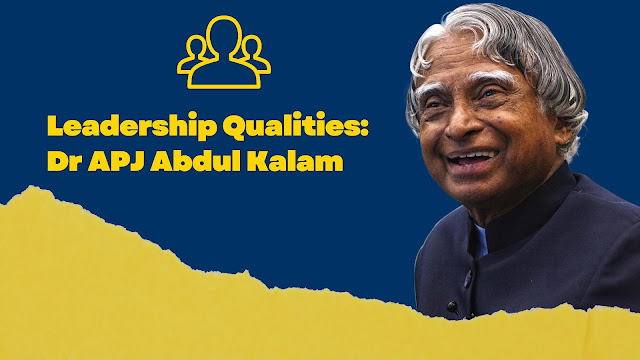Introduction Most people want to be respected. Few actually practice self-respect. And this is where the gap begins. The truth is simple but uncomfortable: people treat you the way you silently teach them to treat you. Not through words, but through tolerance, boundaries, and the standards you accept in everyday life. Respect is not something you demand. It is something you demonstrate—daily, quietly, and consistently. Self-respect is not about arrogance, dominance, or proving anything. It is about knowing your value and living in alignment with it. When you start doing that, people around you naturally adjust. Some step closer, some step away, but the treatment changes. Here are eight practical, non-negotiable ways to respect yourself that instantly shift how others see and treat you. Stop Looking for Those Who Aren’t Looking for You One of the most common forms of self-disrespect is chasing people who show n...
Introduction
Dr. APJ Abdul Kalam was an exceptional individual who stood out as a prominent scientist and leader in India. He served as the President of India from 2002 to 2007 and was fondly known as the "People's President." He was not only an outstanding scientist but also a visionary leader who inspired millions of people through his words and deeds.Despite being an average student in his schooling, Dr. APJ Abdul Kalam had an insatiable curiosity and a deep passion for learning. These qualities led him to pursue aerospace engineering and emerge as one of the most successful scientists in the world. He served four decades as a scientist and science administrator at DRDO and ISRO, overseeing several efficacious projects. Dr. Kalam's contributions to India's missile and nuclear power programs have garnered global attention.
The following are some of the leadership qualities exhibited by Dr. APJ Abdul Kalam:
5 Leadership Qualities: Dr APJ Abdul Kalam
Clear insight
A clear vision of seeing India as a developed nation was what Dr. Kalam passionately pursued, dedicating himself tirelessly to achieving that objective. He viewed technology and innovation as the key driving forces to bring this dream to fruition. Dr. Kalam's leadership was characterised by his ability to inspire his team with his vision and motivate them to work together towards achieving their shared goal.
Courage to make decisions
Dr. Kalam was a leader who was fearless in making tough decisions. He understood that leadership requires making difficult choices and dared to make those decisions. He was not swayed by popular opinion; instead, he followed his conscience and did what he believed was best for the nation.
Manage success and failure
Dr. Kalam was well aware of the significance of managing success and failure and firmly believed in giving credit to his team for their achievements. In his view, victory belonged to the group, while the leader should shoulder the responsibility for failures. Dr. Kalam acknowledged that the team's success was his success and always credited his team for their accomplishments. Conversely, when faced with loss, he took accountability and used it as an opportunity to learn and grow.
Transparency
Transparency was an essential value for Dr. Kalam's leadership. He recognized the significance of clear and open communication and always maintained honesty with his team. Dr. Kalam encouraged his team members to freely express their ideas and opinions and ensured that every voice was heard. He firmly believed transparency was crucial to establishing trust and building a strong team.
A clear vision of seeing India as a developed nation was what Dr. Kalam passionately pursued, dedicating himself tirelessly to achieving that objective. He viewed technology and innovation as the key driving forces to bring this dream to fruition. Dr. Kalam's leadership was characterised by his ability to inspire his team with his vision and motivate them to work together towards achieving their shared goal.
Courage to make decisions
Dr. Kalam was a leader who was fearless in making tough decisions. He understood that leadership requires making difficult choices and dared to make those decisions. He was not swayed by popular opinion; instead, he followed his conscience and did what he believed was best for the nation.
Manage success and failure
Dr. Kalam was well aware of the significance of managing success and failure and firmly believed in giving credit to his team for their achievements. In his view, victory belonged to the group, while the leader should shoulder the responsibility for failures. Dr. Kalam acknowledged that the team's success was his success and always credited his team for their accomplishments. Conversely, when faced with loss, he took accountability and used it as an opportunity to learn and grow.
Transparency
Transparency was an essential value for Dr. Kalam's leadership. He recognized the significance of clear and open communication and always maintained honesty with his team. Dr. Kalam encouraged his team members to freely express their ideas and opinions and ensured that every voice was heard. He firmly believed transparency was crucial to establishing trust and building a strong team.
Leaders humble themselves
According to Dr. Abdul Kalam, genuine leadership did not involve displaying one's authority or position, but rather, it was all about serving others. He utilised his power and influence to empower others and positively impact their lives.
Even though Dr. Kalam achieved numerous accomplishments throughout his life, he remained grounded and approachable. He was aware that his triumphs were not solely a product of his hard work but also of the support and guidance he received from others. Dr. Kalam always had an open mind and was willing to learn from others while acknowledging their contributions.
Dr. Kalam's leadership style was characterised by his humility, transparency, and dedication to his team's success. He was a leader who did not shy away from making tough decisions and managing the success and failures that came with them. His life and work inspire people worldwide, and his legacy will always be remembered as a symbol of hope, perseverance, and leadership. The lessons learned from Dr. Kalam's life and leadership style can continue to inspire and guide individuals toward becoming better leaders who serve others and positively impact their communities.
According to Dr. Abdul Kalam, genuine leadership did not involve displaying one's authority or position, but rather, it was all about serving others. He utilised his power and influence to empower others and positively impact their lives.
Even though Dr. Kalam achieved numerous accomplishments throughout his life, he remained grounded and approachable. He was aware that his triumphs were not solely a product of his hard work but also of the support and guidance he received from others. Dr. Kalam always had an open mind and was willing to learn from others while acknowledging their contributions.
Conclusion
In conclusion, Dr. APJ Abdul Kalam was a remarkable leader admired and loved by many. He was an individual who believed in the power of education, innovation, and, most importantly, serving others. Dr. Kalam led by example and demonstrated his leadership qualities in various capacities, including as a scientist, administrator, and President of India. He was a visionary leader who dedicated his life to transforming his dream of a developed India into a reality.Dr. Kalam's leadership style was characterised by his humility, transparency, and dedication to his team's success. He was a leader who did not shy away from making tough decisions and managing the success and failures that came with them. His life and work inspire people worldwide, and his legacy will always be remembered as a symbol of hope, perseverance, and leadership. The lessons learned from Dr. Kalam's life and leadership style can continue to inspire and guide individuals toward becoming better leaders who serve others and positively impact their communities.


Comments
Post a Comment
Please do not add any spam link in the comment box